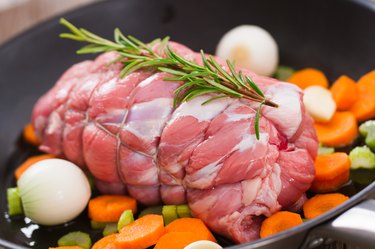Calories Per Pound of Beef Chuck

A chuck roast is also commonly known as a pot roast.
Image Credit: svariophoto/iStock/Getty Images
The "chuck" cuts of beef come from around the shoulder blade of the cow. They contain many small muscles, instead of being a single cut from a larger muscle — but a chuck roast can be very tender and full of flavor when properly cooked.
Chuck Roast Nutrition
A chuck roast is also commonly known as a pot roast. According to the USDA, a 3-ounce serving of braised or boiled pot roast has the following nutritional breakdown:
- 188.4 calories
- 23.1 grams protein
- 9.9 grams fat
- 0 grams carbohydrate
- 0 grams fiber
- 294.6 milligrams sodium
Nutrients of note include 2.7 milligrams iron, 174.6 milligrams phosphorus, 195.6 milligrams potassium, 7.6 milligrams zinc, 19.9 micrograms of selenium and 231 milligrams of cholesterol.
Those figures are based on the assumption that you eat both the lean meat and the fat from the roast. According to the USDA, if you eat only the lean meat, a 3-ounce serving of braised or boiled pot roast has the following nutritional breakdown:
- 131.7 calories
- 24.7 grams protein
- 3.7 grams fat
- 0 grams carbohydrate
- 0 grams fiber
- 339 milligrams sodium
Nutrients of note in the same 3-ounce serving include 2.5 milligrams iron, 150.6 milligrams phosphorus, 180.3 milligrams potassium, 3.9 milligrams of zinc, 23.3 micrograms of selenium and 78.6 milligrams of cholesterol.
Chuck Roast Fat Percentage
As the Mayo Clinic explains, the USDA has specific definitions for lean and extra-lean cuts of beef. Chuck roasts don't quality for the extra-lean designation, which means a 3.5-ounce serving that has less than 5 grams total fat, 2 grams saturated fat and 95 milligrams cholesterol.
But a shoulder or arm pot roast and a shoulder tender roast — all of which qualify as chuck cuts — do count for the lean designation, in which that 3.5-ounce serving has less than 10 grams of total fat, 4.5 grams of saturated fat and 95 grams of cholesterol.
The many small muscles and lean meat of a chuck or pot roast mean it's not the tenderest cut of meat on a cow. But either braising it or boiling it can help create a tender end result.
As the University of Nebraska-Lincoln explains: To braise the roast, you'll brown it on all sides on the stove in a heavy pot or other container. Then add a small amount of water or stock and cook the meat at a low temperature until it's tender — you can do this part in the oven, if you like. To boil the meat, cover it in water and simmer — not outright boil — it for several hours until it's tender.
Reducing Fat Content
If you'd like to reduce your chuck roast calories and saturated fat content, follow some useful tips from the American Heart Association. Start by trimming away any visible fat you can reach.
You can also broil, bake or roast the roast (pun not intended) on a rack so that the fat drips away from it — but because most chuck roasts are already lean and made up of small muscles, be prepared to apply a low-fat baste frequently to keep the meat moist and tender. If you boil the roast or cook it into a soup, you can refrigerate it and then skim the solidified fat off the top.
Why go to that bother? Because reducing saturated fat content is good for your heart. The U.S. Department of Health and Human Services recommends that 20 to 35 percent of your daily calories should come from fat, but less than 10 percent of those calories should be from saturated fat.
howellloosearrose.blogspot.com
Source: https://www.livestrong.com/article/542133-boneless-beef-chuck-roast-nutritional-values/
0 Response to "Calories Per Pound of Beef Chuck"
Post a Comment